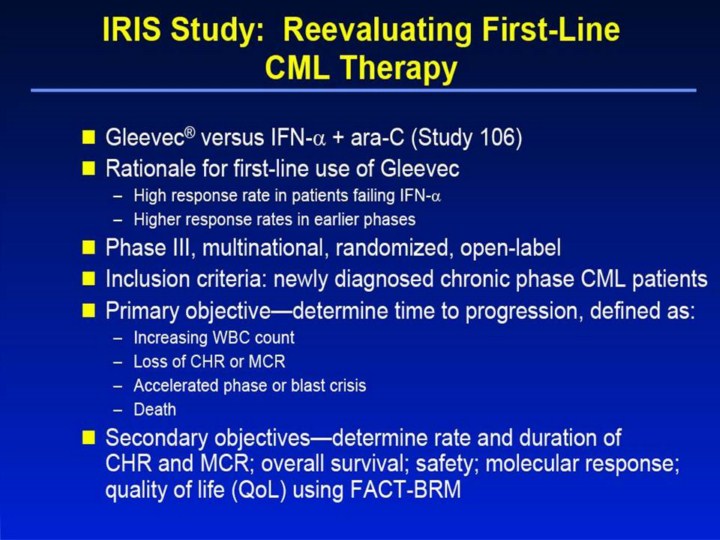| front |1 |2 |3 |4 |5 |6 |7 |8 |9 |10 |11 |12 |13 |14 |15 |16 |17 |18 |19 |20 |21 |22 |23 |24 |25 |review |
 |
IRIS Study: Reevaluating First-Line CML Therapy Gleevec® versus IFN-α + ara-C (Study 106) Rationale for first-line use of Gleevec – High response rate in patients failing IFN-α – Higher response rates in earlier phases Phase III, multinational, randomized, open-label Inclusion criteria: newly diagnosed chronic phase CML patients Primary objective—determine time to progression, defined as: – Increasing WBC count – Loss of CHR or MCR – Accelerated phase or blast crisis – Death Secondary objectives—determine rate and duration of CHR and MCR; overall survival; safety; molecular response; quality of life (QoL) using FACT-BRM [slide 12] IRIS Study: Reevaluating First-Line CML Therapy1,2 • The International Randomized Interferon Versus STI571 (IRIS) study is a phase III trial comparing Gleevec® with IFN-α combined with cytarabine (ara-C) in patients with newly diagnosed, previously untreated, Ph+ CML in chronic phase. • The rationale for first-line use of Gleevec was the high response rate in patients for whom IFN-α had failed and the evidence that earlier use of Gleevec induces higher response rates. • Patients with Ph+ chronic phase CML had to be enrolled within 6 months of diagnosis. • Patients had to have no prior therapy except hydroxyurea or anagrelide. • The primary endpoint is progression-free survival (time to progression) in the 2 randomized patient populations, where progression is defined as any of the following: – Increasing WBC counts in patients without a complete hematologic response – Loss of a complete hematologic response or major cytogenetic response – Progression to accelerated phase or blast crisis – Death • Secondary objectives include determining: – The rate and duration of CHR and MCR – Safety and tolerability – Overall survival – Molecular response (assessed by RT-PCR for bcr-abl expression) in patients achieving a complete cytogenetic response – Quality of life (QoL) using the Functional Assessment of Cancer Therapy - Biologic Response Modifier (FACT-BRM). FACT-BRM is an instrument typically used to assess general effects of interferon toxicity References 1. Gleevec® (imatinib mesylate) Prescribing Information. East Hanover, NJ: Novartis Pharmaceuticals Corporation; 2003. 2. Data on file. Novartis Pharmaceuticals Corporation, East Hanover, NJ. |